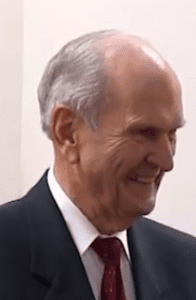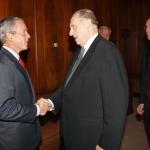
A friend recently asked me to share my thoughts on Russell M. Nelson’s appointment as the new President of the Church and his choice of counselors.
My feelings and thoughts are both still somewhat jumbled, in part because I didn’t actually expect Pres. Nelson to break with the (totally unofficial) tradition and send a counselor back to the Q12. So I’ll ignore my feelings and stick to my thoughts on each apostle who just joined or left the First Presidency, and I’ll give those thoughts to you unfiltered, unedited.
President Nelson: President Nelson is the first president of the Church in some time to be sealed to more than one wife. After his first wife passed away, President Nelson was sealed to a woman who was not even born at the time of his first marriage. In fact, his current wife is younger than his oldest daughter.
Is there anything inherently wrong with a retirement-age man marrying a middle-aged woman who’s more than 2 decades his junior? No, there probably isn’t. Doctrinally, it’s certainly not a sin. However, as a feminist, I can’t help but wonder what influence if any it will have on the way church membership discusses and views the Church’s history with polygamy. I’d hazard a guess that many members don’t have any intention of participating in Eternal polygamy. Certainly, many women find those types of age disparities… squicky, for lack of a better term. When it’s combined with Eternal polygamy, it can feel doubly so.
President Nelson has also been a vocal proponent of the controversial “November policy” that excludes children of same-sex couples from Church ordinances. Given the state of President Monson’s health toward the end of his life, and given the fact he never once made a public statement about the policy himself, I suspect that while he gave his approval of the policy during a lucid moment (and people with dementia do have lucid moments), the policy was likely engineered by others in the Q15, quite possibly senior apostles Nelson and Oaks.
So on some level, I don’t see much changing as far as Church policy. I suspect that Nelson and Oaks have already been directing things. I know some people will say, “But officially the First Presidency leads when the president of the Church is incapacitated,” to which I say: officially, yes – but don’t you think it would make sense for junior apostles in the First Presidency to defer to the judgment of senior apostles whom they know to be next in line? I’m not suggesting a coup or power struggle, to be clear. I’m suggesting that the Q15 talks and is persuaded by the things other members of the quorum say and that it would simply make sense for newer members of the quorum to sometimes defer to the judgment of more senior members.
I do think Matt Bowman makes a good point in his Washington Post piece about how style matters and may change with this shift in leadership:
“Nelson, it seems, may be inclined to a different leadership style. He has been the Mormon leader most vocal in his defense of the church’s 2015 policies on same-sex marriage, calling it “the will of the Lord.” Monson never mentioned the policy change in a public address at all. Nelson has also broken with recent precedent in the selection of his counselors. It is quite common for a new church president to retain the counselors of the president who preceded him in office; indeed, a new church president has not dropped a counselor since 1970.”
President Oaks: adding President Oaks to the First Presidency makes a lot of sense. When President Monson’s health declined, and the senior-most apostle was not in the First Presidency with him, it created uncertainty among many members, who wondered who was really directing things (myself included, as you can tell). Whether there was any uncertainty within the Q15 or it was entirely a misreading from the outside, adding his likely successor to the First Presidency is a very smart move on Pres. Nelson’s part. As a 93-year-old man, President Nelson is likely also anticipating that he may not be in his current role for very long. He could surprise everyone and live another decade, but that’s unlikely.
Oaks and Nelson as a combination certainly send a message of social retrenchment, as so many are pointing out. It’s also noteworthy that yesterday President Oaks explicitly stated that leaders are not infallible. We all know that, but lay members have a tendency to still talk as if the Q15 is infallible.
President Eyring: I can see why President Nelson wanted to keep at least one person from the previous First Presidency, and President Eyring makes sense, as he has more experience there than Uchtdorf and more apostolic seniority. Part of me is a little surprised he didn’t bring in Holland or Ballard and send Eyring back to the Q12, but like I said, it makes sense to keep someone who knows what it’s like to be in the First Presidency.
Elder Uchtdorf: Like many, I’m sad that he will likely give fewer General Conference talks now (especially during Women’s Session). Like most Mormons, I’m guilty of having favorite apostles, and Uchtdorf is definitely my favorite. While selecting spiritual thoughts for a class I was teaching at one of the CES schools, I once realized that half of my spiritual thoughts were Uchtdorf quotes. No, it was not something I’d planned. Those were just the quotes that spoke to me.
Some members will speculate that his return to the Q12 is a rebuff of the inclusivity he has preached. However, I don’t see any evidence that President Nelson was motivated by something like that. I find it far more likely that the reasons I listed above motivated him to make these changes. And it wouldn’t surprise me if Uchtdorf found his way back into the First Presidency 5 or 10 years down the road.
Overall thoughts: Like many members who were and remain troubled by the infamous November Policy, I’m cautious about some things right now. LGBTQ Mormons are on my mind this week, and I understand why this change in leadership is difficult for so many of them. However, I don’t think the direction the Church is currently heading will change under the new leadership, even if it sometimes feels different, since Nelson and Oaks have such different personalities than we grew used to with Monson and Uchtdorf in the First Presidency.
I also suspect there could be some surprises in the future that will reassure progressive Mormons somewhat. I’m very curious to see who is called to the two vacant apostleships in April, though I’m still afraid to get my hopes up about seeing more racial diversity in that quorum. And I’m relieved that the current President of the Church has his mental faculties and a surprising amount of energy for someone in his nineties.












